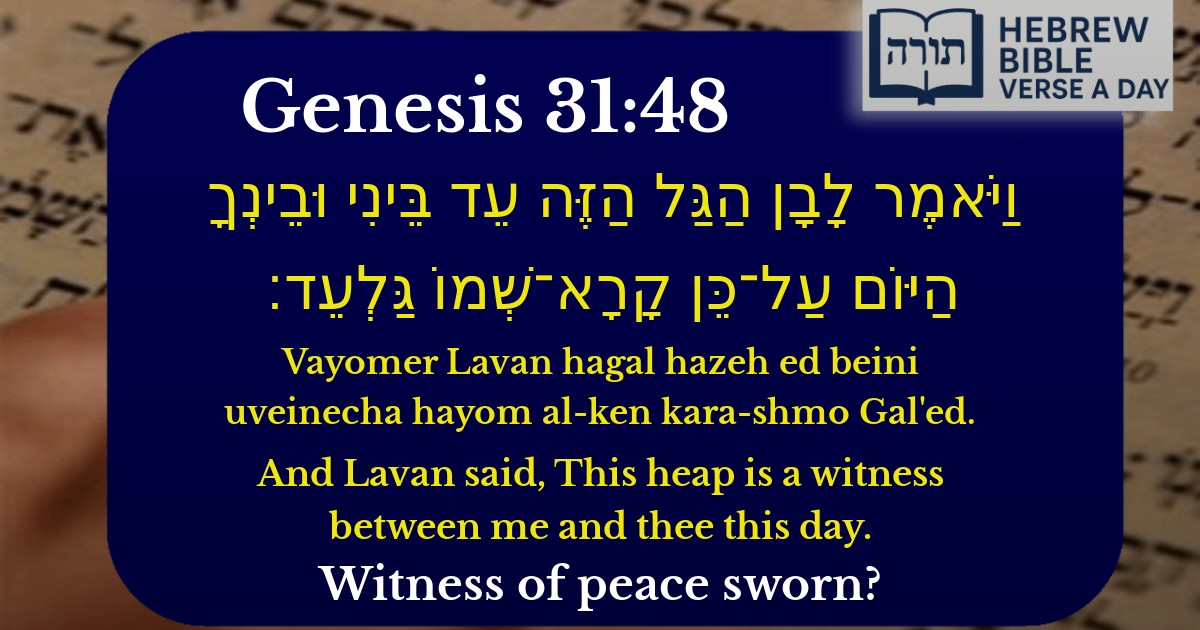Join Our Newsletter To Be Informed When New Videos Are Posted
Join the thousands of fellow Studends who rely on our videos to learn how to read the bible in Hebrew for free!
Hebrew Text
וַיֹּאמֶר לָבָן הַגַּל הַזֶּה עֵד בֵּינִי וּבֵינְךָ הַיּוֹם עַל־כֵּן קָרָא־שְׁמוֹ גַּלְעֵד׃
English Translation
And Lavan said, This heap is a witness between me and thee this day.
Transliteration
Vayomer Lavan hagal hazeh ed beini uveinecha hayom al-ken kara-shmo Gal'ed.
Hebrew Leining Text
וַיֹּ֣אמֶר לָבָ֔ן הַגַּ֨ל הַזֶּ֥ה עֵ֛ד בֵּינִ֥י וּבֵינְךָ֖ הַיּ֑וֹם עַל־כֵּ֥ן קָרָֽא־שְׁמ֖וֹ גַּלְעֵֽד׃
וַיֹּ֣אמֶר לָבָ֔ן הַגַּ֨ל הַזֶּ֥ה עֵ֛ד בֵּינִ֥י וּבֵינְךָ֖ הַיּ֑וֹם עַל־כֵּ֥ן קָרָֽא־שְׁמ֖וֹ גַּלְעֵֽד׃
🎵 Listen to leining
Parasha Commentary
📚 Talmud Citations
This verse is quoted in the Talmud.
📖 Chullin 89a
The verse is referenced in a discussion about the significance of names and their meanings, particularly how names can serve as witnesses or memorials.


The Covenant Between Yaakov and Lavan
The verse (Bereishit 31:48) describes Lavan establishing a covenant with Yaakov, marked by a heap of stones (gal) as a witness between them. Rashi explains that this heap served as a boundary and testimony, ensuring that neither Yaakov nor Lavan would cross it with hostile intent. The name Gal-Ed (Galed) reflects its purpose as a "witness heap," combining the Hebrew words for "heap" (gal) and "witness" (ed).
Symbolism of the Heap
The Midrash (Bereishit Rabbah 74:13) elaborates that the stones represented the future unity of the Jewish people. Just as the heap was formed from many stones joined together, Klal Yisrael would emerge from Yaakov's descendants as a unified nation. The Sforno adds that the heap symbolized divine providence—Hashem had protected Yaakov from Lavan's deceit, and this covenant affirmed His ongoing supervision.
Legal and Ethical Implications
Linguistic Insight
Radak highlights the poetic symmetry in the naming of Gal-Ed, as it mirrors the Aramaic term Yegar Sahaduta used earlier (Bereishit 31:47). This duality emphasizes the bilingual nature of their agreement, ensuring clarity and mutual understanding between Yaakov (Hebrew speaker) and Lavan (Aramaic speaker).